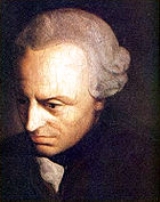
philosopher from Königsberg
(today Kaliningrad
of Russia
), researching, lecturing and writing on philosophy
and anthropology
at the end of the 18th Century Enlightenment
.
At the time, there were major successes and advances in the sciences (for example, Isaac Newton
, Carl Friedrich Gauss
, and Robert Boyle
) using reason and logic. But this stood in sharp contrast to the scepticism and lack of agreement or progress in empiricist philosophy.
Kant’s magnum opus
, the Critique of Pure Reason
(Kritik der reinen Vernunft, 1781), aimed to unite reason with experience to move beyond what he took to be failures of traditional philosophy and metaphysics
.
The wish to talk to God is absurd. We cannot talk to one we cannot comprehend — and we cannot comprehend God; we can only believe in Him. The uses of prayer are thus only subjective.![]()
Religion is too important a matter to its devotees to be a subject of ridicule. If they indulge in absurdities, they are to be pitied rather than ridiculed.![]()
Since the narrower or wider community of the peoples of the earth has developed so far that a violation of rights in one place is felt throughout the world, the idea of a cosmopolitan right is not fantastical, high-flown or exaggerated notion. It is a complement to the unwritten code of the civil and international law, necessary for the public rights of mankind in general and thus for the realization of perpetual peace. ![]()
The death of dogma is the birth of morality.![]()
By a lie a man throws away and, as it were, annihilates his dignity as a man. A man who himself does not believe what he tells another ... has even less worth than if he were a mere thing. ... makes himself a mere deceptive appearance of man, not man himself.![]()
Enlightenment is man’s leaving his self-caused immaturity. Immaturity is the incapacity to use one's intelligence without the guidance of another. Such immaturity is self-caused if it is not caused by lack of intelligence, but by lack of determination and courage to use one's intelligence without being guided by another. Sapere Aude! Have the courage to use your own intelligence! is therefore the motto of the enlightenment.
![]()
Through laziness and cowardice a large part of mankind, even after nature has freed them from alien guidance, gladly remain immature. It is because of laziness and cowardice that it is so easy for others to usurp the role of guardians. It is so comfortable to be a minor!
![]()

